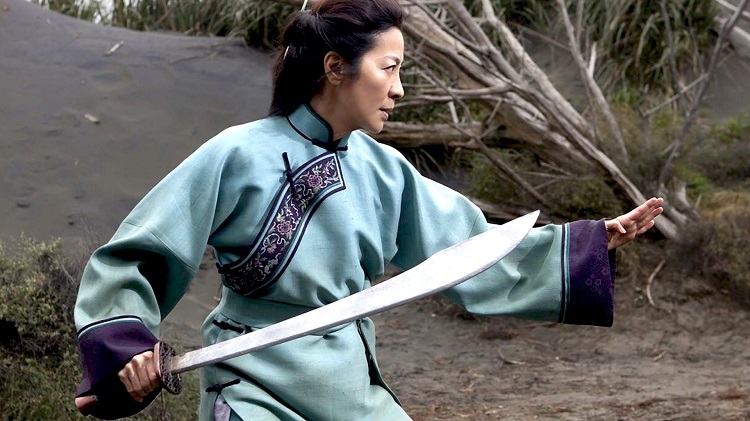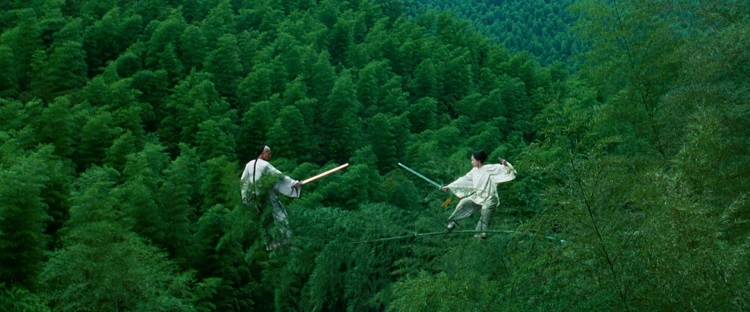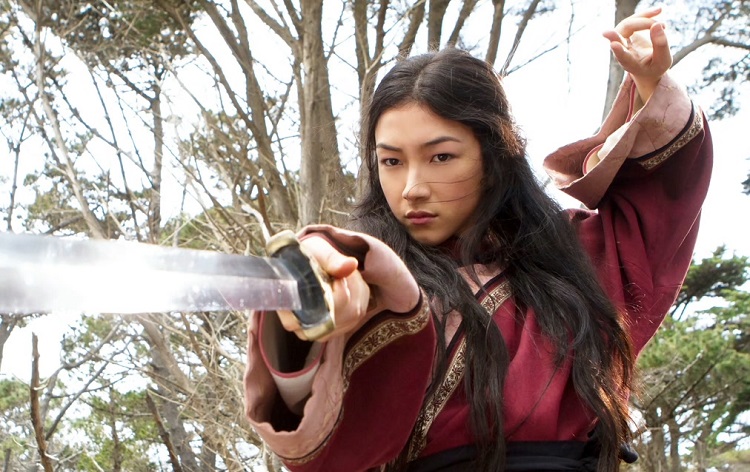Subtext | The Long Road to Crouching Tiger, Hidden Dragon: Sword of Destiny
Even if you’ve never heard of Yuen Woo-Ping, I can almost guarantee you’ve seen his work. A legendary Hong Kong film director in the 80s and 90s, he’s responsible for launching the career of not one but two martial arts legends. His first film, Snake in the Eagle’s Shadow, featured a young actor who some saw as “the new Bruce Lee”, Jackie Chan. Yuen recognised that Chan was something far different, and worked with him to draw that out in his next film, Drunken Master. This created the slapstick style Chan became famous for, and established Yuen as both a great director and a great person to work with. In 1984 the lead in Yuen’s 11th film, Drunken Tai Chi, was the first acting role for a young stuntman named Donnie Yen. The film didn’t do that well, but Yuen gave his leading man plenty of opportunities to show off his impressive physical presence. Nine years later, after starring as the villain in Once Upon A Time In China 2, Yen reunited with Yuen to create one of the classics of 90s Hong Kong cinema: Iron Monkey. It was around this time that Yuen began moving away from pure directing and into the role that would make him famous in Hollywood: action choreography.
It’s no exaggeration to say that The Matrix is one of the most influential films of the 90s. It revitalised the science fiction genre. It popularised the “smart action movie”, mixing philosophy into the story. Most notably it permanently raised the bar for action in Hollywood movies, bringing the high octane energy of Hong Kong across the Atlantic. The Wachowskis did this by bringing someone they considered a peerless action director in to direct their action: Yuen Woo-Ping. They had seen his work in Iron Monkey and as action choreographer for the 1994 Jet Li movie Fist of Legend. Rather than try to imitate his style, they were humble enough to bring the man himself across to do it for him. The result made Yuen a recognisable name for Western audiences.
Two years later in 2001 Yuen added another notch to his belt as action director for Ang Lee’s Crouching Tiger, Hidden Dragon – the first wuxia film to become a major international hit. (In fact it was the first foreign-language film ever to break the $100 million mark at the US box office.) The same year another fan of his, the director Quentin Tarantino, arranged for Iron Monkey to get a US theatrical release eight years after it originally came out. It pulled in a very respectable fourteen million dollars, going on to become a hit on DVD and laying the path for many classic wuxia movies to follow it onto the new format. Yuen, meanwhile, went on to direct the action in Tarantino’s Kill Bill movies as well as the Matrix sequels and quite a few Chinese films. One of these was Stephen Chow’s Kung Fu Hustle, proving that Yuen’s ability to work with emerging talent was still strong. In 2010 he returned to the director’s chair for True Legend, and he has directed three more films since then. The first of those three films are what we’re going to look at today.

Crouching Tiger, Hidden Dragon: Sword of Destiny (2016, Netflix)
Wuxia (pronounced woo-shah) is a Mandarin word that translates literally as “fighting heroes”, and it’s also the name for one of the most popular genres of Chinese fiction. Internationally it’s identified primarily with movies. Pretty much every classic martial arts period piece falls into the wuxia genre. In China it’s been used to describe novels and stories in general about these heroes since the 1910s, though the genre itself goes back over 2000 years into folklore and the oral tradition. One popular author of wuxia fiction (as well as science fiction and mystery novels) in the 1930s and 1940s was Wang Baoxiang, who wrote under the name Wang Dulu. His best-known work is a five-volume multigenerational wuxia saga known as the Crane-Iron Series. This is in part because of the fourth book in the series, Crouching Tiger, Hidden Dragon.
Wang wrote the first book in the series, Precious Sword, Golden Hairpin, in 1939. (The title is a quote from Chinese poetry with relevance to the plot, like the rest of the series.) It told the story of two star-crossed lovers – Li Mu Bai and Yu Shu Lien. (Much later, in the Crouching Tiger film, they would be played by Chow Yun Fat and Michelle Yeoh.) Li falls in love with Yu, but she is already engaged and he takes on the job of rescuing her fiance, Meng Si Zhao. Meng is at the time on the run for defying a local tyrant. When Li meets Meng he does not know who he is and tells him about his feelings for Yu, and Meng decides Li would be better for Yu than him. Meng tells Li this, but when Meng dies saving his life Li decides that he cannot follow through on it. The sequel (Sword Spirit, Pearl Light) has the two caught up in the struggle over a book of secret martial arts techniques, still unable to declare their love for each other. The third book (Crane Frightens Kunlun) was a prequel to the series, about the early life of the two heroes’ teacher Southern Crane.

The movie Crouching Tiger, Hidden Dragon actually blends elements from the book with ideas from Sword Spirit, Pearl Light – specifically the idea of hidden techniques and a secret order trying to retrieve them, as well as Li and Yu’s unspoken love. From the book Crouching Tiger, Hidden Dragon comes the story of governor’s daughter Yu Jiao Long (played by Zhang Ziyi) stealing the sword Green Destiny on her wedding day and fleeing, because she is in love with a bandit leader named Lo Xiao Hu (played by Chang Chen). The film’s conclusion follows the original book while adding its own ending to the story of Li Mu Bai and Yu Shu Lien, something that Wang Dulu never did (as Yu dies between the fourth and fifth books, while Li barely appears after the third book).
Crouching Tiger, Hidden Dragon: Sword of Destiny, like its predecessor, blends elements of the fifth book (Iron Knight, Silver Vase) with its own original plot. That plot follows on from the previous film by continuing Yu Shu Lien’s story. This makes sense, as Michelle Yeoh makes for a great link between the two films and is still an extremely popular actress twenty years later. Donnie Yen joins the story as Meng Si Zhao, Yu’s former fiance who the movie retcons as having faked his own death to retire to meditate in the mountains and to allow Li Mu Bai to court her. (He didn’t realise that it was his “death” that would come between them.) Natasha Liu Bordizzo makes her debut in the film playing Snow Vase, one of the main characters of the original novel where she was the adopted daughter of Yu Jiao Long. (Here she is the daughter of a new character named Han Mei, presumably to avoid having to get Zhang Ziyi to return.) Harry Shum Jr plays Wei Fang, the other main character of the original novel who is linked to Snow Vase by a twist of fate when they were born.

Crouching Tiger, Hidden Dragon: Sword of Destiny is not as good as the first film; that’s an indisputable fact. For a lot of critics when it came out that was all they needed to say, and for many that was enough to denounce it as a cynical cash grab. That isn’t really fair though. It’s not a bad movie at all, in fact it’s quite good. It may not measure up to one of the best wuxia films of the modern era, but by definition few do. A part of this is a legacy of bitterness hanging over the movie. Originally Ang Lee wanted to follow Crouching Tiger, Hidden Dragon up with a prequel based on one of the earlier three novels. In fact he was on the verge of beginning production in 2006 when a lawsuit broke out between Columbia Pictures and the Weinstein Corporation, both of which claimed to have been sold the rights to the series by Wang Dulu’s heirs. Both might have been telling the truth. Regardless, it left Sword of Destiny forever in the shadow of a film that was never made.
The rights dispute was eventually settled, obviously, and the film was made. Yuen Woo-Ping was actually the only creative team member from the original film to return, as neither Ang Lee nor the writing team came back. (Michelle Yeoh was likewise the only cast member to return.) In general it was a much more Western production too – most of the actors are actually Americans or Australians of Asian descent, and the film was shot in English rather than Mandarin. All of this fuelled the idea of it being a cynical cash-in project. I don’t think that’s fair, however. The writing may not be as lyrical, and the direction as artistic, as the first film. But the script does weave together the strands of the first film’s plot and the novel’s story with deep cuts from the original series pretty well. Yuen may not have the flair of Ang Lee, but his action instincts remain as strong as they ever were.
This is not the only recent film of Yuen Woo-Ping that’s available on streaming services, however. In the second instalment of this mini-series we look at the other two films Yuen has done in the last five years – a homage to classic wuxia called The Thousand Faces of Dunjia, and a spin-off from a class series, Master Z: Ip Man Legacy.

